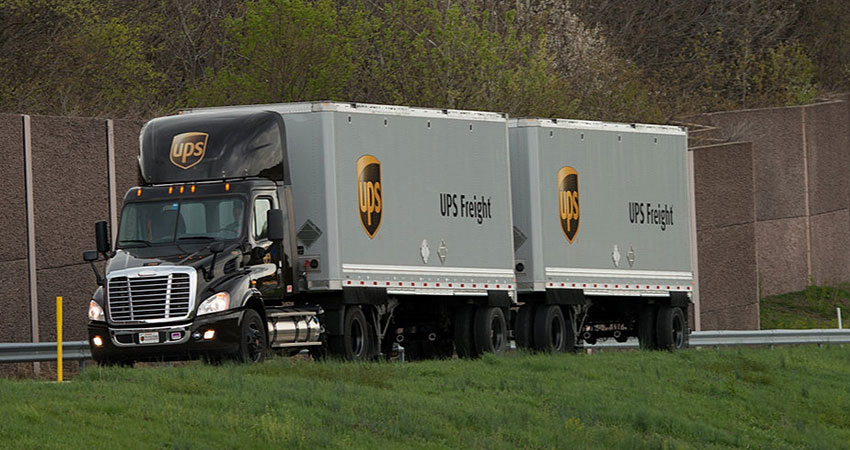UPS has been telling customers to be prepared in case the Teamsters union votes down a tentative five-year contract with its UPS Freight less-than-truckload (LTL) division later this month, giving them a cutoff calendar for freight shipments starting today.
While the majority of ecommerce volume is handled by the UPS Ground parcel division, merchants rely on UPS Freight for shipments to their fulfillment centers, and to stores that handle online orders.
Teamsters working for UPS Freight will be voting on the contract between Nov. 7-11. Union leadership has already signaled its willingness to strike sometime after Nov. 12, when the voting period closes.
More than 60% of the 12,000 eligible union voters struck down UPS Freight’s contract proposal last month, leading to an extension that expires Nov. 12. UPS made its last-best offer on Oct. 25, but the original proposal is what the Teamsters will be voting on.
The company’s UPS Ground parcel division was able to settle its contract with the Teamsters last month, even though more than half of those voting went against it. But because fewer than 50% of eligible voters participated, a two-thirds majority no vote was required to nix the contract, so it was automatically ratified.
“To ensure transparency and not put your volume at risk, starting Thursday, Nov. 1 UPS will not pick up any UPS Freight volume with a delivery date after Nov. 8,” the company said in a note today to customers. “The last day UPS will pick up UPS Freight will be Thursday, Nov. 1 for five-day shipping commitments; Friday, Nov. 2 for four-day shipping commitments; Monday, Nov. 5 for three-day shipping commitments; Tuesday, Nov. 6 for two-day shipping commitments; and Wednesday, Nov. 7 for one-day shipping commitments.”
UPS spokesman Glenn Zaccara said the company wanted to make sure that shippers had adequate notice in the event of a “no” vote by Teamsters on the UPS Freight contract in order to make contingency plans.
“We are disappointed that the Teamsters union leaders have chosen to announce the potential for a strike, should their members vote no on the offer,” Zaccara said. “The company has now begun discussions with UPS Freight customers to inform them of the potential for service disruption and the need to arrange alternative carriers. Because we don’t have a guarantee against a work stoppage, we cannot afford to put our customers’ volume at risk of being stranded in our system. Therefore, we will work to empty our network of freight by Friday, Nov. 9.”
Industry experts said with the number of available options for shippers in LTL, and the relatively low market share handled by UPS, the extra volume should be easily absorbed. But with capacity so tight especially at this time of year, shippers can expect to pay rates at or above what UPS charged. For some UPS customers its Coyote Logistics division could be an alternative provider.
The Journal of Commerce puts UPS Freight at number 5 in its ranking of the top 25 LTL carriers, with a 6.9% share of the $37.7 billion market in 2017; FedEx was number 1 with 16.8%.
“There are so many options with LTL, and shippers typically have a transportation management system (TMS) or a rate card that allows them to choose between multiple carriers,” said Thomas Anderson, executive vice president and partner with LJM Group. “On the contrary, if UPS small parcel shut down, FedEx would have capacity constraints and would be unable to service new customers.”
Satish Jindel, president of shipping data firm Shipmatrix, said he believes UPS Freight is the company’s least profitable division. Jindel added UPS’s negotiating posture and now the note to customers is evidence of that.
“They don’t have enough money to recapitalize equipment, so how can they compensate employees?” Jindel said. “UPS is taking the position, if the union wants to strike, we’ll just sit it out and let them strike. It’s not gamesmanship, it’s putting their cards on the table saying, ‘if I had room to give you more I would but I can’t.’”
Given the tight nature of the LTL market and steeper pricing as a result, Jindel speculated that UPS would gain back most of its lost freight business once the labor dispute is resolved. “No one is going to give them attractive rates in this market,” he said.
Parcel consultant Gerald Hempstead disagreed with Jindel, saying competitors will try to lock in fleeing UPS shippers in the event of a “no” vote from the Teamsters, instead of letting them go back to big brown.
“It’s really going to cost some shippers during the outage, and the carriers that step up like FedEx might demand a longer-term deal,” Hempstead said. “What happened with the vote is highly unusual. It’s a real embarrassment to the union negotiating team.”
Rob Martinez, founder and CEO of consultancy Shipware, said the note to customers is a tacit acknowledgement by UPS that the union will vote down the pact.
“They (UPS) don’t want customer inventory custody issues as loads are abandoned throughout the network,” Martinez said. “I guess if there’s any good news, it’s that unlike small parcel which is dominated by the FedEx and UPS duopoly there are many LTL alternatives in every region.”

